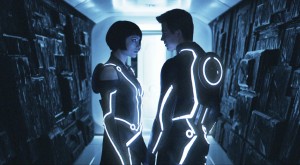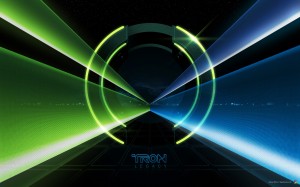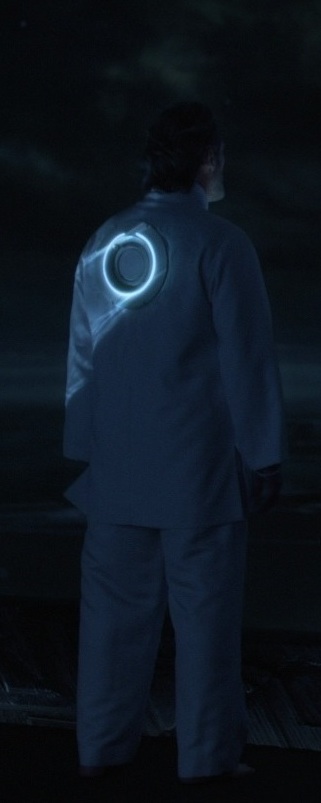“Your father was the creator.” – Quorra, from Tron: Legacy
 Jeff Bridges doesn’t play a divine trinity in Tron Legacy, but he does present a curious trifecta of world creator, absent father, and slightly Lebowski-channeling aging 80s hipster. While the last one provided vocal audience response with claps and laughter, the first two are what we’ll delve into with the next few posts. The first TRON film clearly toyed with religious metaphor, as creator-Flynn dove deep into a world of programs who saw him as one of their makers (i.e. a god). Now, any biblical cross-references were immediately messy, as the analogy provided both a polytheistic parallel (multiple programmers = multiple gods) and an “imperfect god” scenario. For instance, when the believing Tron assumes everything Flynn does is part of a plan, Flynn responds:
Jeff Bridges doesn’t play a divine trinity in Tron Legacy, but he does present a curious trifecta of world creator, absent father, and slightly Lebowski-channeling aging 80s hipster. While the last one provided vocal audience response with claps and laughter, the first two are what we’ll delve into with the next few posts. The first TRON film clearly toyed with religious metaphor, as creator-Flynn dove deep into a world of programs who saw him as one of their makers (i.e. a god). Now, any biblical cross-references were immediately messy, as the analogy provided both a polytheistic parallel (multiple programmers = multiple gods) and an “imperfect god” scenario. For instance, when the believing Tron assumes everything Flynn does is part of a plan, Flynn responds:
Kevin Flynn: Hah, you wish. You guys know what it’s like, you just keep doing what it looks like you’re supposed to be doing, no matter how crazy it seems.
Tron: That’s the way it is for Programs, yes.
Kevin Flynn: I hate to disappoint you, pal, but most of the time, that’s the way it is for users too.
 Tron: Legacy extends this view of creator and takes it to the next level. While it seems Flynn is the sole creator of “the Grid”, where the characters interact in the new film, and might suggest more of a monotheistic bent, the consequences of what he does with CLU and the grid are beyond any plan he might have, and he’s been “winging it” as usual. To drive the point home even harder in Legacy, a form of digital life “sprung into existence” in the Grid, apart from the maker’s hand.
Tron: Legacy extends this view of creator and takes it to the next level. While it seems Flynn is the sole creator of “the Grid”, where the characters interact in the new film, and might suggest more of a monotheistic bent, the consequences of what he does with CLU and the grid are beyond any plan he might have, and he’s been “winging it” as usual. To drive the point home even harder in Legacy, a form of digital life “sprung into existence” in the Grid, apart from the maker’s hand.
Flynn explains that these new life forms, “ISOs”, just came into existence because the right circumstances all came together for life to happen… it’s a computer-based version of a pre-biotic soup without a mind or designer behind it, a way to have your creator and evolution it too. The god of the Grid is surprised by his own creation as life springs forth he didn’t plan for. Unable to protect these life forms, undone by his own image-bearer – thwarted by his own creations – the father-creator Flynn is reduced to the classic Joan Osborne song – “what if God was one of us, just a slob like one of us”… just a stranger on a solar-sailor trying to make his way home.
 “…perfection… is unknowable…” – Kevin Flynn
“…perfection… is unknowable…” – Kevin Flynn
Now more than ever in our culture, Tron: Legacy reinforces basic, diminishing concepts about Creator/creation that have lingered since Zeus was found to be imperfect and even undone by his own Greek creations. More recently, this would be the notion that “God is learning along with us, and changing the world in the face of new circumstances”, the idea of limited omniscience coupled with open theism.
While it’s doubtful most viewers are thinking consciously about this as they watch identity disks slice across the screen, it sprinkles some seeds for later application when viewers are pondering their own place as creation in relation to the sovereignty and perfection of our Creator:
1. Is our creator fallible?
2. Did we come forth via accident/evolution and surprise/impress God?
3. Does God have a plotted plan for the future, or is he reacting to us?
4. Can we thwart our Creator’s plans?
5. Is God off somewhere distant, befuddled like Flynn, out of the game and uncertain of how to approach mankind or address the current problems of this world?
The God revealed in biblical scripture looks nothing like our reductionist musings; he is not given to surprise, confusion, imperfection, or treating life like bad improv, and there is a blessed assurance inherent: “This God—his way is perfect; the word of the Lord proves true; he is a shield for all those who take refuge in him.” – Psalm 18
Does this gross lack of parallel taint my enjoyment of the film? Actually, not at all. When one considers the equally important narrative lesson Tron: Legacy embraces, (that even the classic novel Frankenstein would tell us) that man fails fantastically at playing god… it stokes the conversation that highlights our desperate need for Him. Sadly, in the film there is little place for the god of the Grid, as the programs have rejected him and the word “user” is spoken like a bad word. There is none who seeks Flynn, no not one. The movie toys with our corporate rejection of the creator.
As the story begins, we are given the possibility that Flynn has sent for his son to come into the world he made, but (without spoiling plot points) suffice it to say the film doesn’t successfully spin this into a redeeming parallel. In fact, this aspect of Flynn’s legacy raises an even stronger narrative thread of the film, the failed father, which we’ll look at in the next post.


Hello!
I agree with your analysis of our society and the way it now perceives the deity concept (infaillible no more?). Just wanted to point out that you have failed to mention what I noticed the second time I saw the movie. As Flynn walks into the ‘bar’ at Line’s end to save everyone, one program falls to his knees and stars praying to him.
I think this probably even reinforces your argument as who would not be swayed in the presence of the divine itself? Hmm…another way to see it is that there are always believers still even in a society where people have rejected God. Which is the case in my neck of the woods where, as a society, we rejected religion about 50 years ago.
See ya around
Rob
Great insight Rob, it is amazing for an ultimately very plot-light film that there are so many conversation-sprinkles splashed around like pixels. If God walked into a bar, it would be interesting to see the varied reactions… I suspect some knees would definitely be floor-bound.
[…] A “god’s” legacy in TRON […]
[…] A “god’s” legacy in TRON […]